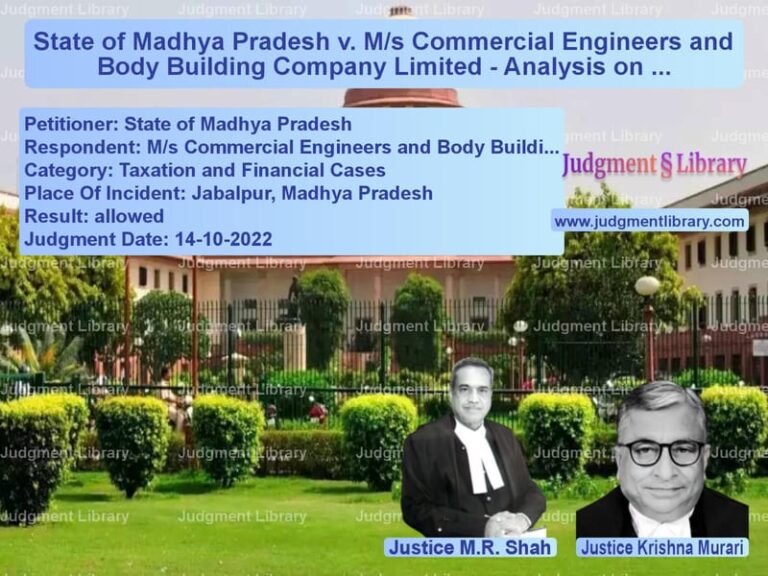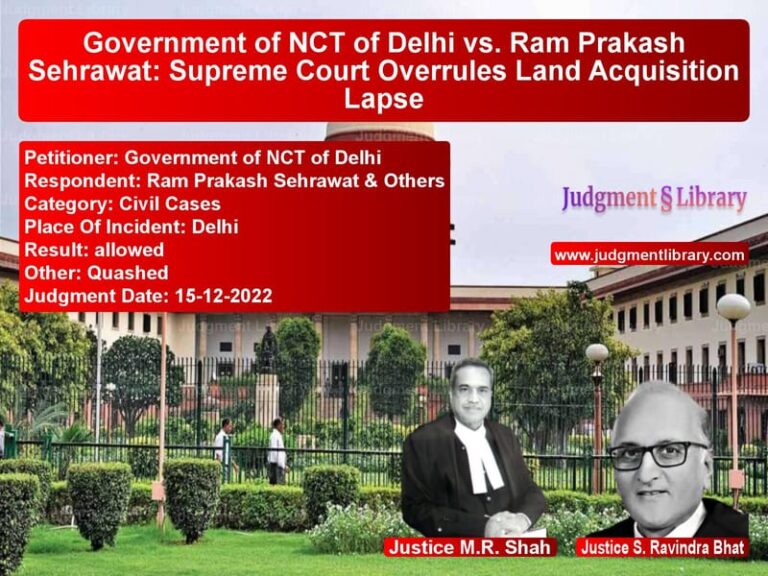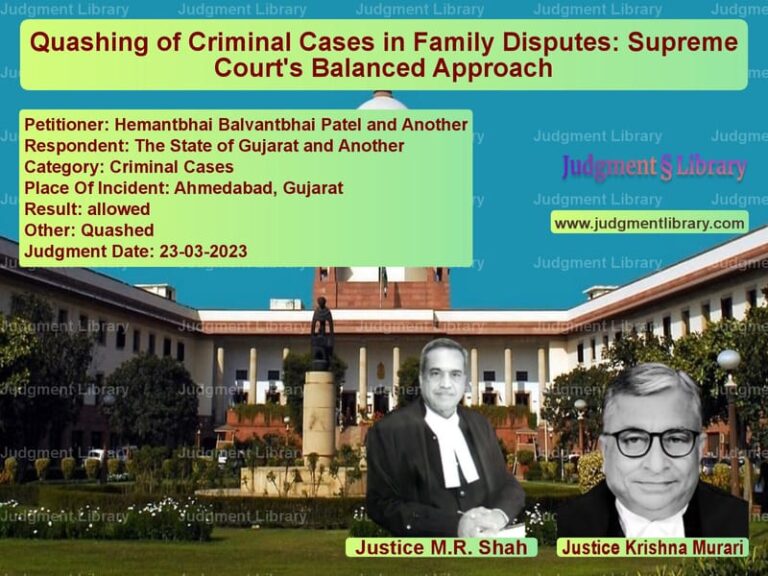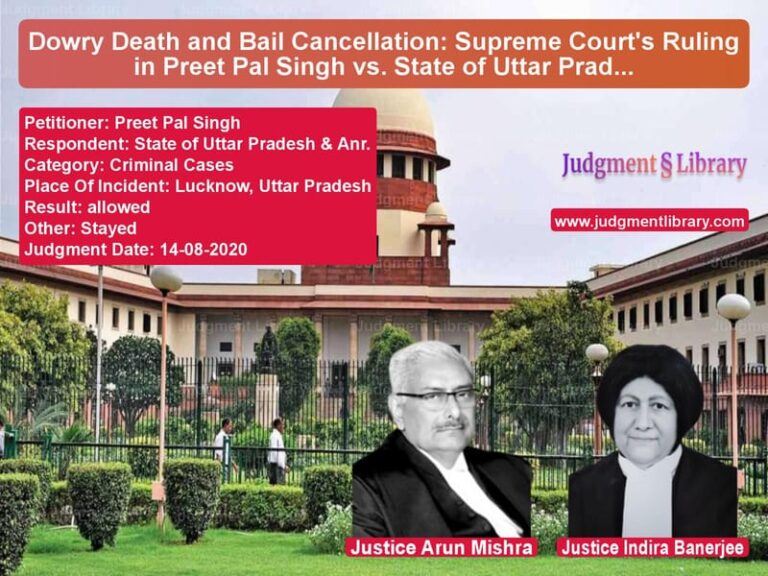Supreme Court Strikes Down Time-Barred Insolvency Case Against La-Fin
The Supreme Court of India recently ruled on a significant case involving the applicability of limitation laws to insolvency proceedings. The case, Jignesh Shah & Anr. v. Union of India & Anr., revolved around whether a time-barred winding-up petition under the Companies Act, 1956, could be converted into a valid insolvency proceeding under the Insolvency and Bankruptcy Code, 2016 (IBC).
Background of the Case
The dispute stemmed from a share purchase agreement executed on August 20, 2009, between Multi-Commodity Exchange India Limited (MCX), MCX Stock Exchange Limited (MCX-SX), and IL&FS Financial Services Ltd. (IL&FS). La-Fin Financial Services Pvt. Ltd. (La-Fin), a group company of MCX, issued a Letter of Undertaking to IL&FS, stating that La-Fin would purchase shares of MCX-SX from IL&FS within three years, expiring in August 2012.
IL&FS exercised its option to sell the shares to La-Fin on August 3, 2012, but La-Fin refused to honor the obligation. Consequently, IL&FS filed a suit for specific performance in the Bombay High Court on June 19, 2013. Meanwhile, on October 21, 2016, IL&FS also filed a winding-up petition against La-Fin under Section 433(e) of the Companies Act, 1956. When the IBC came into force on December 1, 2016, the pending winding-up petition was transferred to the National Company Law Tribunal (NCLT) as a Section 7 application.
Arguments of the Appellants (Jignesh Shah & Others)
The appellants, represented by Dr. Abhishek Manu Singhvi, raised the following key arguments:
- The winding-up petition was filed in October 2016, four years after the default in August 2012, making it time-barred under Article 137 of the Limitation Act, 1963.
- The Supreme Court’s ruling in B.K. Educational Services Pvt. Ltd. v. Parag Gupta & Associates (2018) had established that the Limitation Act applies to IBC proceedings, meaning a time-barred debt cannot be revived.
- A civil suit for specific performance does not extend the limitation period for initiating insolvency proceedings.
- IL&FS itself acknowledged the default date as August 19, 2012, in its Form-1 application under IBC, proving that the claim was beyond the three-year limitation period.
Arguments of the Respondents (IL&FS & Others)
The respondents, represented by Mr. Neeraj Kishan Kaul, countered with the following arguments:
- The winding-up petition and the civil suit were independent remedies, and the insolvency proceedings should not be considered time-barred.
- La-Fin’s financial condition had deteriorated significantly by 2016, justifying insolvency proceedings.
- Filing a suit for specific performance kept the debt alive, and limitation should be calculated from the date of the suit rather than the date of default.
- Commercial insolvency should be considered as a separate factor while evaluating whether a company can be wound up under IBC.
Supreme Court’s Analysis
1. Applicability of Limitation Act to IBC
The Supreme Court reiterated that Section 238A of the IBC made the Limitation Act applicable to insolvency proceedings. It referenced its earlier decision in B.K. Educational Services, stating:
“An application that is filed in 2016 or 2017, after the Code has come into force, cannot suddenly revive a debt which is no longer due as it is time-barred.”
2. Distinction Between Civil Suits and Insolvency Proceedings
The Court held that filing a civil suit for specific performance does not extend the limitation period for filing insolvency proceedings. It cited multiple judgments emphasizing that a separate legal remedy does not interrupt limitation.
3. Date of Default
The Court examined IL&FS’s Form-1 filing under IBC, which clearly mentioned August 19, 2012, as the date of default. Since the winding-up petition was filed more than three years later, it was time-barred.
4. No Revival of Time-Barred Claims
The Court rejected the argument that the transfer of the winding-up petition to NCLT under IBC could revive a time-barred debt. It ruled:
“The IBC cannot be triggered in 2017 for a debt which was time-barred in 2015, as that would lead to the absurd consequence of the Code being triggered by a stale claim, leading to corporate insolvency.”
Final Judgment
The Supreme Court ruled in favor of the appellants, holding that the insolvency application filed under Section 7 of IBC was time-barred. The Court stated:
“A winding-up petition filed beyond three years from the date of default is barred by limitation and cannot be revived through IBC proceedings.”
The Court set aside the NCLT and NCLAT rulings and dismissed the insolvency application against La-Fin.
Implications of the Judgment
This ruling has significant implications for insolvency law in India. Key takeaways include:
- The Limitation Act applies to all insolvency proceedings under IBC, ensuring that time-barred debts cannot be revived.
- Filing a civil suit does not extend the limitation period for initiating insolvency proceedings.
- Transferring a winding-up petition under the Companies Act to IBC does not make a time-barred claim valid.
- Insolvency proceedings must be filed within three years of default under Article 137 of the Limitation Act.
The Supreme Court’s decision ensures that IBC is not misused to resurrect stale claims and reinforces the importance of adhering to limitation laws in insolvency proceedings.
Petitioner Name: Jignesh Shah & Anr..Respondent Name: Union of India & Anr..Judgment By: Justice R.F. Nariman, Justice R. Subhash Reddy, Justice Surya Kant.Place Of Incident: Mumbai, Maharashtra.Judgment Date: 25-09-2019.
Don’t miss out on the full details! Download the complete judgment in PDF format below and gain valuable insights instantly!
Download Judgment: Jignesh Shah & Anr. vs Union of India & Anr Supreme Court of India Judgment Dated 25-09-2019.pdf
Direct Downlaod Judgment: Direct downlaod this Judgment
See all petitions in Bankruptcy and Insolvency
See all petitions in Corporate Compliance
See all petitions in Judgment by Rohinton Fali Nariman
See all petitions in Judgment by R. Subhash Reddy
See all petitions in Judgment by Surya Kant
See all petitions in allowed
See all petitions in Quashed
See all petitions in supreme court of India judgments September 2019
See all petitions in 2019 judgments
See all posts in Corporate and Commercial Cases Category
See all allowed petitions in Corporate and Commercial Cases Category
See all Dismissed petitions in Corporate and Commercial Cases Category
See all partially allowed petitions in Corporate and Commercial Cases Category







